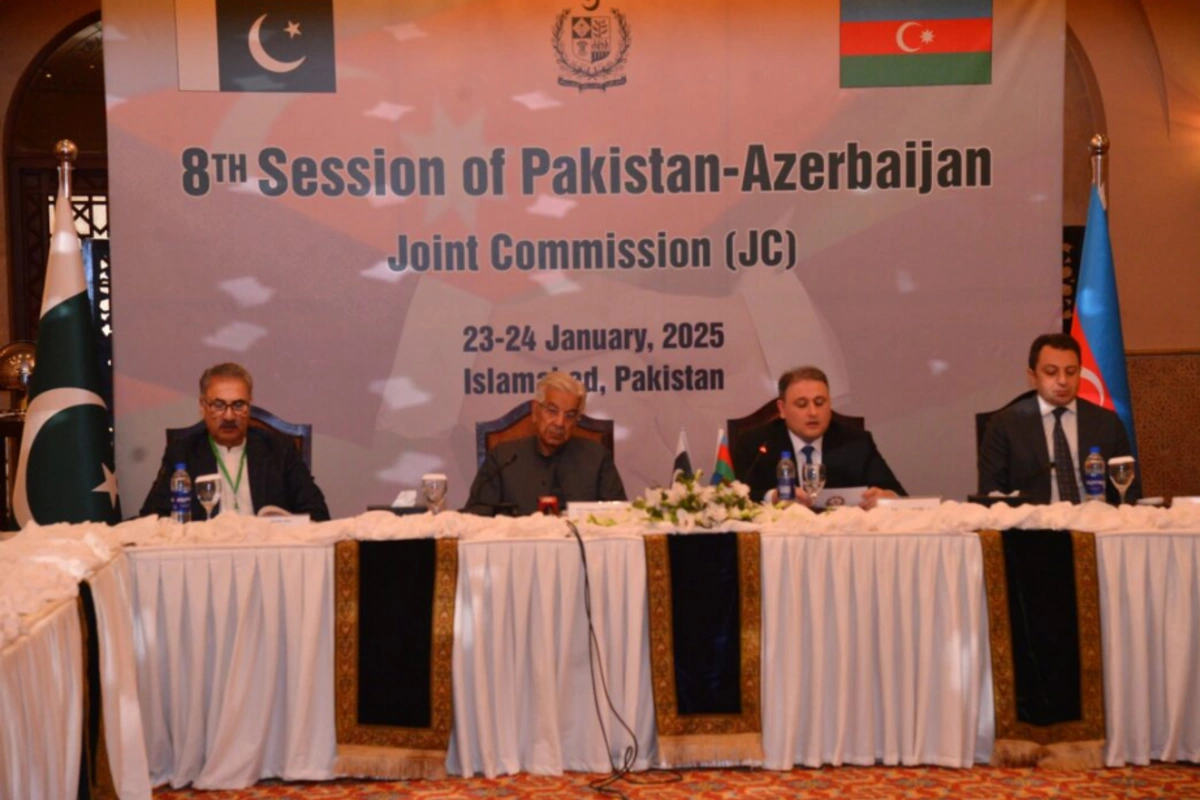
Photo: Azertac
The 8th session of the Pakistan-Azerbaijan Joint Commission concluded in Islamabad on Friday, reaffirming both nations’ dedication to enhancing bilateral relations across multiple sectors. Co-chaired by Khawaja Muhammad Asif, Pakistan’s Federal Minister for Defence and Defence Production, and Vugar Mustafayev, Azerbaijan’s Minister for Defence Industry, the session underscored the deep-rooted ties between the two countries.
During the session, productive discussions were held on expanding cooperation in areas such as trade, defense, energy, ICT, agriculture, transport, health, and education, The Caspian Post reports citing local media.
Pakistan’s Minister for Defence, Khawaja Asif, welcomed Azerbaijan’s delegation, expressing pride in the historic and enduring friendship shared by the two nations, built on mutual respect, cultural connections, and solidarity on global issues. Highlighting past high-level exchanges, including visits by President Ilham Aliyev and Prime Minister Shehbaz Sharif, he noted the significant strides made in energy, defense, and trade collaboration.
Minister Asif emphasized that the agreements reached during the session would further enhance cooperation in agriculture, health, IT, defense, and tourism. He also announced the establishment of new Joint Working Groups to drive economic growth, foster private sector collaboration, and promote cultural exchange.
Vugar Mustafayev, expressed his honor at participating in the session, reaffirming Azerbaijan’s unwavering support for Pakistan, particularly on issues of sovereignty and territorial integrity. He noted the enduring friendship between the two nations, emphasizing their shared values and mutual respect. He praised the agreements reached during the session as pivotal for strengthening bilateral ties in defense, trade, energy, education, and agriculture. Minister Mustafayev also highlighted the creation of new Joint Working Groups as a key step towards deeper collaboration.
Kazim Niaz, Pakistan’s Federal Secretary for Economic Affairs, added that both sides agreed to implement the Azerbaijan-Pakistan Preferential Trade Agreement signed in July 2024 and explore joint ventures and investments between businesses from both countries. He also highlighted plans to expedite the signing of a Memorandum of Understanding (MoU) to establish an Advance Electronic Data Interchange between Azerbaijan’s State Customs Committee and Pakistan Customs Service.
On defense industry cooperation, both nations pledged to accelerate the signing of an MoU to enhance joint production and sales of defense hardware. In the energy sector, discussions focused on advancing the Strategic Underground Gas Storage (SUGS) project in Pakistan and inviting Azerbaijan to participate in energy infrastructure initiatives, including the White Oil Pipeline.
Agriculture and food security emerged as key priorities, with agreements to conduct joint research on cotton, grain cultivation, and seed development. Both sides also committed to fostering business-to-business exchanges to boost agro-commodity trade.
In health, the parties agreed to collaborate on advanced diagnostics, public health emergencies, and medical tourism, while exploring avenues for health-related research and capacity building.
Looking ahead, the two sides confirmed that the 9th session of the Joint Commission will take place in Baku, Azerbaijan, in 2027. Both Pakistan and Azerbaijan reiterated their commitment to deepening bilateral ties, fostering mutual development, and ensuring prosperity for their peoples in the years to come.
Share on social media